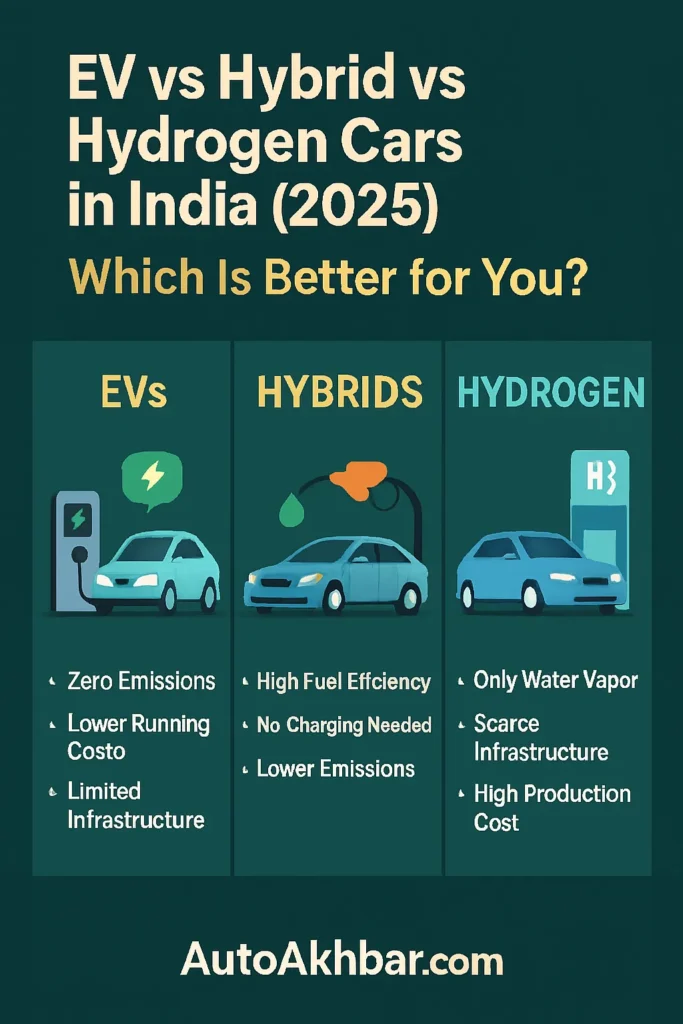By AutoAkhbar.com – India’s trusted auto news source
EV vs Hybrid vs Hydrogen Cars in India (2025): Which Is Better for You?
🚗 Introduction: The Auto Shift Is Real
India’s automobile industry is undergoing a massive transformation. With electric vehicles (EVs) gaining traction, hybrids making a comeback, and hydrogen emerging as a wildcard, the question is: Which technology truly suits India’s roads, wallets, and environment?
“Sab future ki baat karte hain, par present ka jugaad kaun kare?” That’s where hybrids shine.

Table of Contents
🔋 EVs: Clean, Cool, but Still Complicated
Electric vehicles offer:
- Zero tailpipe emissions
- Lower running costs (₹1/km or less)
- Government subsidies under FAME II
But challenges remain:
- Charging infrastructure is limited
- Battery sourcing is China-dependent
- Power grid still runs on 70% coal
EVs are ideal for urban use, but rural India and long-distance drivers still face range anxiety.
👉 EV vs Hybrid India Guide – Vecharged
“For latest EV launches, check our EV News section.”
🔄 Hybrids: The Smart Middle Ground
Hybrids combine petrol engines with electric motors, offering:
- High fuel efficiency (20–25 km/l)
- No need for external charging
- Lower emissions without grid stress
They’re perfect for Indian conditions—long drives, unpredictable traffic, and limited charging points.
“Hybrid gaadi ka matlab hai tension-free driving, bina charger ke jhanjhat.”
👉 Hybrid vs EV in 2025 – 91Wheels
💨 Hydrogen: Cleanest Fuel, But Not Yet Practical
Hydrogen fuel cell vehicles emit only water vapor. Sounds perfect, right?
But:
- Infrastructure is nearly non-existent
- Production cost is high
- Technology is still evolving
Experts say hydrogen will be viable post-2040, especially for commercial fleets and heavy-duty transport.
👉 Are Hybrids Better Than EVs – Forbes India
🌐 China’s Grip on EV Supply Chain
India’s EV ecosystem heavily relies on Chinese imports:
- 75–85% of battery components are China-controlled
- Lithium, anode, cathode—all sourced externally
- Strategic risk for long-term energy security
Hybrids reduce this dependency by using smaller batteries and existing fuel infrastructure.
🔌 Charging Infrastructure: Still Catching Up
India needs over 5 million public chargers by 2030. Currently:
- Charger-to-EV ratio is poor
- Fast charging is limited
- Rural areas are underserved
Hybrids bypass this issue entirely—just fuel up and go.
🌱 Carbon Footprint: EV vs Hybrid
EVs have zero tailpipe emissions, but battery production emits significant CO₂. Hybrids offer:
- Lower fuel consumption
- Reduced emissions
- No grid stress
Until India’s electricity becomes greener, hybrids may offer better overall sustainability.
🏭 What Are Indian Brands Doing?
Major automakers are betting big on hybrids:
- Maruti Suzuki – Swift & Fronx with mild hybrids
- Hyundai – Creta Hybrid launching in 2027
- Honda – Elevate Hybrid in development
- Toyota – Leading with strong hybrid tech
- Tata – Exploring hybrid options post EV slowdown
Clearly, hybrids are not just a backup—they’re a strategic move.
🏁 Conclusion: Coexistence Is the Key
EVs are the future, but hybrids are the present. Hydrogen is the long-term bet. India needs all three to coexist, depending on geography, use case, and affordability.
“Gaadi future ki ho ya present ki—decision samajh ke lena chahiye, sirf trend dekh ke nahi.”
Stay tuned to AutoAkhbar.com for unbiased, tech-savvy auto insights.
FAQs EV vs Hybrid vs Hydrogen
Which is better for Indian roads: EV or Hybrid?
Hybrid cars are more practical for long drives and areas with limited charging infrastructure.
Are hydrogen cars available in India?
Currently, hydrogen cars are in testing phase. Mass adoption is expected post-2040.
What is the cost difference between EV and Hybrid cars?
Both start around ₹15–18 lakh, but hybrids save on charging infrastructure costs.